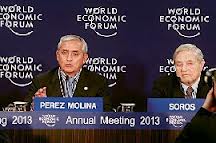Guatemalan President Otto Perez Molina, the first Guatemalan President to be invited as a speaker to the Davos World Economic Forum, delivered on his promise to spark the drug policy debate in Davos. During a press conference on the opening day, Perez Molina called for a new approach towards regulating drugs, implemented “on a scientific basis” and geared at reducing the harms associated with the illegal drug trade.

“Prohibition, this war on drugs, has seen cartels grow and the results are not what we looked for, … There is a new trend towards drugs now – not war, but a new perspective and a different way of dealing with the problem” declared Perez Molina. Since taking office in January 2012, Perez Molina has advocated a regulatory approach to drugs, rather than the extremes of a full-blown war on drugs or free-market legalization.
Guatemala has been particularly affected by the War on Drugs because of its location on the most transited drug trafficking route in the world and has become a battleground between the two dominant Mexican drug cartels, the Sinaloa Cartel and the brutal and much feared Los Zetas. The two cartels are caught in a ferocious fight over the control of the Caribbean and the Pacific routes, with local populations caught in the middle. The cartels largely outgun the police and army, and corrupt all institutions, starting with the justice system.
The right-wing retired general found an unlikely ally in Davos with Georges Soros who joined him to announce a Drug Policy Reform summit in Tika, Guatemala, scheduled for June 2013. The summit will gather world leaders and policy organizations to discuss alternative drug control proposals in June 2013. According to the president’s official press release, the summit will be organized in coordination with the Soros foundation, as well as the Beckley Foundation and the Carter Foundation. Based in the UK, the Beckley Foundation established a Guatemala office in June 2012 and has worked closely with President Perez Molina and his government on issues of drug policy. The Foundation director, Amanda Feilding, met with President Molina in Guatemala on January 17 to deliver proposals for alternative drug policy options.
Billionaire philanthropist George Soros, a major advocate for drug policy reform, stressed the illegal drug trade’s harmful effects on developing democracies, declaring “Drug policy has endangered political stability and security in many countries, and not just in Latin America.” He then talked about the situation in Mali which has turned into a North African hub for the drug cartels since the Libyan revolution, on the route from Latin America to Europe via West Africa. The cartels have taken advantage of the instability and established alliances with guerilla groups and Islamist extremists, while the instability affecting the entire region from Nigeria to West Africa, Tunisia and Libya, has turned this impoverished country, once one of the most stable in Africa, into a regional and international nexus of Islamic extremism.
Perez Molina is increasingly taking a leadership position in the fight for drug policy reform on the world scene. In a recent interview to the UK Observer, Perez Molina declared: “I believe western countries fail to understand the reality that countries such as Guatemala and those of Central America have to live in. There has been plenty of talk, but no effective response. I believe, ultimately, that this is due to a lack of understanding on the part of western countries.” He added that western leaders must look beyond their domestic agendas. “A message should be sent to the leaders of the countries with the biggest drug markets. They must think not only of… the context of their country, but of what is happening in the world, in regions such as Central America, where this destruction, this weakening of democracy, is happening. They must be open to recognising that the struggle against drugs, in the way it has been conducted, has failed.”
By bringing the drug policy debate to the World Economic Forum, Perez Molina is reaching out to the business community, which could open up a new strategy in the push for drug policy reform. While pushing for reform with other Latin American leaders at the UN and at the Organization of American States, Perez Molina has powerful potential allies within the business community, which could help build up the pressure and fuel the momentum for reform, as a surprising number of companies have voiced support for a regulated drugs market.
Perez Molina expects a change of attitude in the US following the decisive victories for drug legalization in Colorado and Washington, and is building on the momentum it created: “There is going to be a change away from the paradigm of prohibitionism and the war against drugs, and there is going to be a process that will take us towards regulation. So I would expect a more flexible and more open position from President Obama in his second term.”
http://www.guardian.co.uk/business/2013/jan/23/george-soros-guatemala-war-on-drugs
Also at the Davos Forum, Costa Rican President Laura Chinchilla said Wednesday that her country, Mexico and Colombia have opened talks with U.S. officials to prepare for the legalization of marijuana in some U.S. states. In reaction to the Guatemalan government call for a debate on drug regulation, Laura Chinchilla declared that criminalizing drug use is “far from the solution”, but ruled out legalization in her own country for the time being. http://www.i4u.com/video-gallery/Laura-Chinchilla#zc3oyE7HYykelv1G.99
Jeffrey Dhywood
Investigative writer,
Author of “World War D – The Case against prohibitionism, roadmap to controlled re-legalization”
Download a free 50-page excerpt: http://www.world-war-d.com/.
“World War-D” on Amazon: http://www.amazon.com/dp/0984690409/
Facebook page: http://www.facebook.com/worldward
Follow me on Twitter: @JDhywood
Become a better informed activist and support global drug policy reform!
Order your own copy of “Word War-D”
- The reference book on the War on Drugs and prohibitionism
- A guide to psychoactive substances and substance abuse
- A blueprint for global drug policy reform and controlled legalization
Media inquiries- book reviews – speaking engagements: contact promo@world-war-d.com

